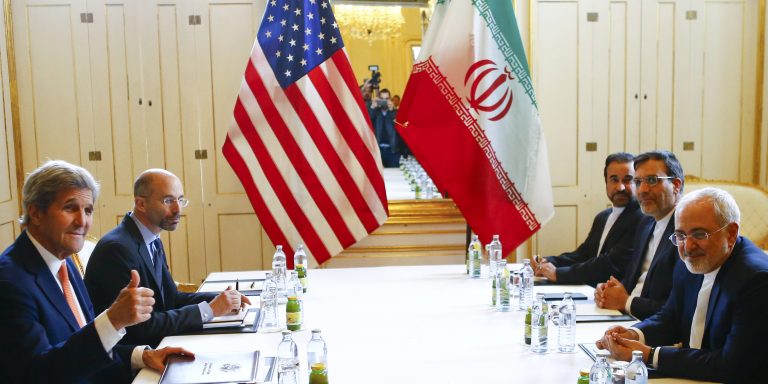INTELBRIEF
May 9, 2018
IntelBrief: U.S. Withdrawal from the Iran Nuclear Deal

- On May 8, President Trump ended U.S. participation in the landmark 2015 Iran nuclear agreement by re-imposing all U.S. sanctions on Iran’s core economic sectors.
- Reminiscent of the run-up to the 2003 Iraq invasion, President Trump’s withdrawal statement contradicted statements from U.S. intelligence directors by implying that Iran has not fully complied with its nuclear commitments under the accord.
- The President’s withdrawal appears predicated on an assumption, shared by very few experts, that U.S. sanctions will compel Iran to renegotiate the accord or will cause Iran’s regime to collapse.
- European and other reactions to the U.S. withdrawal suggest that global cooperation with re-imposed sanctions on Iran will be limited, if not absent.
.
As expected, on May 8 President Trump ended U.S. participation in the 2015 Iran nuclear deal—the Joint Comprehensive Plan of Action (JCPOA)—to which not only the United States and Iran but also Britain, France, Germany, Russia, and China are parties.He ordered the reinstatement of all U.S. sanctions on core economic sectors that were suspended to implement the JCPOA, with an allowed ‘wind-down’ period of 90–180 days. The wind-down period potentially allows time for European countries to continue trying to forge a supplementary agreement that addresses President Trump’s central criticisms of the JCPOA: that the nuclear restrictions expire, that it does not prohibit Iran from developing ballistic missiles, and that it provides Iran with additional economic resources with which to interfere in the region’s many conflicts.
Yet, the immediate statements of ‘regret’ from European leaders to the Trump decision suggest that there will be minimal international cooperation with re-imposed U.S. sanctions, and likely only a modest effect on Iran’s economy. Perhaps predicting that U.S. sanctions will not have the effect they did during 2011-2015, Iran’s President Hassan Rouhani responded to the Trump statement by vowing to cooperate with the other JCPOA parties to keep the agreement intact. Yet, Iran reserved the option of restarting banned aspects of its nuclear program should its economy deteriorate sharply from re-imposed U.S. sanctions.
President Trump’s statements appeared to adopt elements of an early May briefing by Israeli Prime Minister Netanyahu—long a champion of tearing up the Iran deal—alleging that Iran is not fully complying with the JCPOA because it still harbors an ambition to develop a nuclear weapon. The implication of non-compliance directly contradicts recent statements by Secretary of State Mike Pompeo and Director of National Intelligence Dan Coats that Iran is fully complying with its commitments. The decision also appeared to adopt assumptions long advanced by the new National Security Adviser, John Bolton, as well as Netanyahu, that re-imposed U.S. sanctions will force Iran to renegotiate the JCPOA to take into account the Administration’s demands or, perhaps even lead to the collapse of Iran’s regime.
In making these arguments—which most Iran experts dispute—President Trump’s decision appeared similar to the 2003 Iraq invasion, which was based on false intelligence that Iraq was reconstituting weapons of mass destruction and that U.S. troops would be greeted as ‘liberators.’ Some of those who argued for the pullout from the Iran deal were the same officials who had argued for the Iraq invasion: most notably, Mr. Bolton. The fact that there has been no accountability for the decision to invade Iraq—one of the worst foreign policy blunders in the history of the United States—means that similar mistakes can be made with similar detrimental consequences, only this time it is with Iran. The President’s statement articulated no new policy or strategy for confronting Iran’s regional malign activities, suggesting that, just as was the Iraq invasion, the consequences of the withdrawal from the JCPOA had not been fully thought through. The administration was merely concerned with projecting a zero-sum game stance.
.
For tailored research and analysis, please contact: info@thesoufancenter.org
[video width="960" height="540" mp4="https://thesoufancenter.org/wp-content/uploads/2018/05/Final-Edit-1-190.mp4" poster="https://thesoufancenter.org/wp-content/uploads/2018/05/AP_986082747727.jpg"][/video]